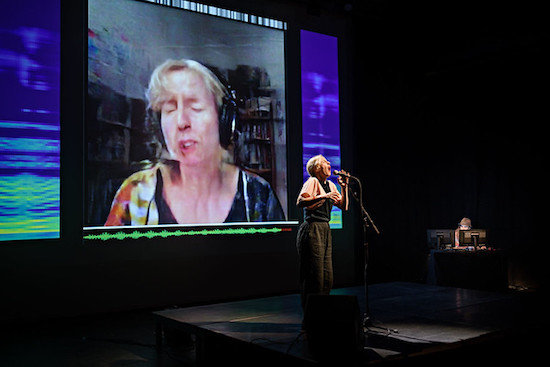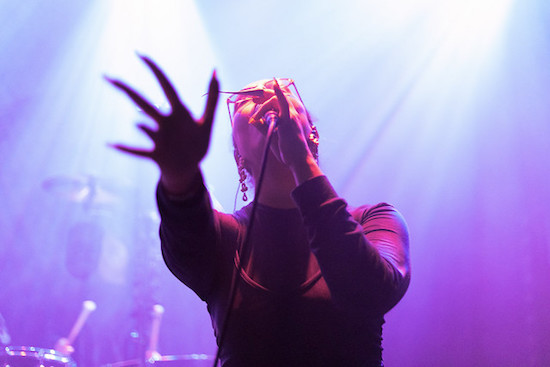Lafawndah live by Jan Rijk
At Rewire Festival I’m reminded of a feeling I had while reading about life newly discovered in the deep hot biosphere. Testing Thomas Gold’s 25-year-old hypothesis, geobiologists drilled towards the mantle. Within core samples they found micro creatures within. Beneath us improbably, was life, that soft word, as above, so below. Over the weekend, at its best, Rewire enacted a similar investigation. Instead of a tardigrade sinking slowly down to the bottom of the sea floor, a reimagining makes us wonder if something even stranger burrows upwards from below, from a deeper point of origin. At a plateau, a time of waiting, near and dramatic changes to technological and atmospheric sovereignty have us asking what comes next.
Lucrecia Dalt, Columbian geotechnical engineer turned musician & poet, speaks of this deep existence. Sitting on stage early on Sunday, she talks of a great bending of the Earth and of the psyche. In this rendition of her album Anticlines, the ancient and buried are forced up out of the ground to the ear. A metronome with a mysteriously wobbling stem ticks back and forth. It’s the sound of Dalt’s voice in the stereo field, delicately parted. The words are full of spectral holes. I make out: “We breath tar, as only lovers breath tar”, and, “What am I but edge? You ask me.” The hole we enter is both bodily and earthly. From this point near the end of the festival, Dalt’s is refreshingly un-shiny music. Old-brass, oxidised. It’s super elegant music, so I feel clumsy describing it as ‘cave-ified’, but short reverb and delay tails do give the effect of sounding beneath a claustrophobically low ceiling. This beautiful matt contrasts with the sometimes overly glittery experience of Rewire’s main evening venue, Paard. Korzo Theatre, the selection of Protestant Churches, and a venue called The Grey Space provided much better listening experiences. It was these smaller spaces which presented some of the most moving acts. And why come to the arrant middle of the legal world just to hear the big names?
The creative economy of the festival trickles up. Aurélie Nyirabikali Lierman composes with sounds for and from her 108-year-old Rwandan grandfather, Sogokuru. Entering a small and lightless studio, the audience is given Bluetooth headphones and gentle instructions to wear them correctly. This technology becomes self-evident once performers, as indistinct forms in the dark, begin to make sounds. In the middle of the stage is a disembodied latex head. It’s an object which has gained popularity in YouTube and Twitch’s ASMR communities. At Rewire, Lierman uses this technology instead as a method for environmental embodiment. Performed sound emanates from instruments on stage, while simultaneously we hear (nearly) internally, a highly directional duplicate coming from our headphones. The effect is subtle and convincing.
The ensemble roll marbles, spin empty tubes which make tones out of the air, and play their instruments in dancing ways. The act is playful, non-linear and strange. This is music totally without ego. Lierman possesses an exquisite voice but what she does is "unsinging". The revelation in meaning comes from the sudden introduction of a field recording from Rwanda. It sounds from a place of teeming life. Everything the performers on stage have so far produced, every small and momentary utterance, appears to us now starkly as a representation of Lierman’s home. Their playing which moves around the space and within our ears, is an unearthing of place, a form of sonic animism. Foreign birds and cows mooing are animated as alive and alien from the vibration of a frame drum dragged upon the floor. By becoming so acutely aware of the direction of a sound, the field recording is, in one sense, physically modelled live on stage. Out of all the efforts of representation this weekend, screens, holograms, videogame engines and tables of knobs and controllers, Lierman’s invention was perhaps the most inspiring.

Jennifer Walshe & Memo Akten live by Pieter Kers
There was a lot of talk here of artificial intelligence collaborations. I’ll line them up from least imaginative to most: Sinjin Hawke & Zora Jones’s piece was algorithmically infused, a bland and greedy spectacle); Ash Koosha’s YONA was sweet and haunted by the 90s; Actress & a UK-flag adorned bucket-hat wearing rag doll which on screen must learn how to get out of bed (excellent visuals by Werkflow!); and finally, Jennifer Walshe exploring a fertile pelican crossing between her real and AI voices.
An open question to the reader: do you think you can tell whether an experiment is genuine or not? For example, I think luminaries like Jennifer Walshe are audibly and visually sincere in their testing. A close friend announced on the timeline this week that: “an experiment is an undertaking where the outcome is not known. The more unknowns, the more experimental.” I thought about this while viewing these frontier attempts at using machine learning. I connected with performances which introduced vulnerability as an expression of camaraderie with the audience. A statement of true experimentalism this weekend became something like – ‘I’ll embrace these unknowns and flirt with the collapse of my own ego, in an effort to explore new technology’. Actress forgetting to plug in his laptop’s power cord was an example of this kind of vulnerability. The machine played the same deafening kick drum sample for ten minutes. All praise to a distinguished producer who decides to risk improvising with heavy programs like these.
Music Hackspace and Goldsmith’s Dr Rebecca Fiebrink spoke against AI scepticism. In her keynote, machine learning was described as a method which could help the less-abled and inspire a flattening of the hierarchy of creative labour. This was machine learning as described from an anti-elitist perspective. A refreshing position considering the kind of hoarding of technique exhibited on the circuit of big European experimental festivals. The prohibitively expensive cost of having a computer powerful enough to perform these operations, and the old-guard producers who have had support and funding to be the first to use this technology, loom dangerously over the next generation of composers. Compliment to those who share their technical knowledge. But depose the guards who use new technology as a stepladder for selfish artistic-legacy.
This year, Rewire is combined with Festival Dag in de Branding. The tag line is ‘unexplored music’. The easy combination of the two festivals, which shared their venues, led many of the late-night crowd (I assume) unexpectedly into a contemporary concert setting: a singularly focused space, no exit and encore bows. Pushing the boundaries of the violin-performer-conglomerate, Diammanda Dramm was a total revolution for me. I’m at odds to spoil the effect of going in blind, but her playing progressed from an absolute unravelling of the violin, to the unexpected singing of songs of innocence, to a fierce close: two large kick drums (nearly half the size of her stature), played facing backwards, Dramm’s face to us and body swaying as if walking on an elliptical machine. Within was the quietest and most delicate moment of the festival: a platinum screen lighting up to show hand drawn lines like mazes and pareidolic faces, blending to become a flock of starlings making shapes at sundown. An image enhanced by Dramm’s sung mantra: “The nature of youth is in doubt, the nature of youth is doubt.”

Actress + Young Paint live by Raymond van Mil
This was a highlight: ensembles acting as a singular instrument; instruments acting as skin, as automatons, as wooden and fleshy clairvoyants; voices and throats acting as a mud to traverse. See Kelly Moran’s prepared piano, see the DIY instrument making at Studio Loos, see Ensemble Klang. And Rewire’s unique point of interest is exactly this Dutch experimental scene. This is a country where locals and expats have the dwindling honour to receive government funding for truly progressive (and un-market driven) projects.
Speaking of ensembles, CURL were my pick of the festival. The core of Mica Levi, Coby Sey and Brother May were joined on stage by TONE and Roxanne Tataei. They opened chanting in unison, “Work harder merk fast gotta keep working living for the now.” Each repeat gave me shivers. There was an anger to the statement – here we are, stuck together on the neoliberal treadmill of the somatic self. Repeating words at the speed of a Nyege Nyege Tapes sample (coincidently a great conclusion to Friday night), everyone in CURL spoke evenly, shared each other’s instruments, and acted as a singular and unapologetically searching organism. Each piece seemed to start from a place of uncertainty. Gently, it would twine together. The guitar heavy line-up was broken by Roxanne Tataei’s exquisite vocal array and the four four words of Say and May’s duet, pointing towards a bland and mundane argument of a day to day life which becomes magical when injected with shared spirit.
As I get back up out of the centre of the festival I think of what led me in. The opportunity to see imaginative acts and think new ideas. It’s a simple proposition. As my fourth trip in a row to Rewire, this year’s curation was the most diverse and inspiring of the bunch. At a point where it’s easy to feel the petering out of political urgency, the discourse was focused and the acts expressed and communicated their own agency. Of course there is more to say: Jesse Osborne-Lanthier with a renewed and world-giving sound; Lafawndah’s glorious songs; and Tanya Tagaq, singing a call and response with her own body, her homeland, the logorrheic cry of a changing planet and the warning of our Earth – a vengeful mother. I’m left now with lingerings like these. Tardigrade forms surviving the harsh rules of creative practice today. New movement from the deep, and a few pearls growing slowly in the mouth and mind.


